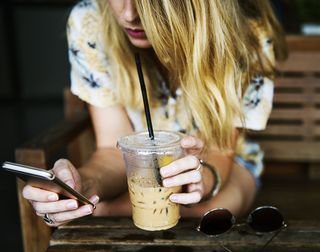Happiness
Is Facebook Bad for You?
Find out if Facebook is helping or hurting your happiness and well-being.
Posted November 30, 2017

Did you know that the average Facebook user uses a combination of Facebook and Instagram an average of 50 minutes per day? That’s more time than the average person spends socializing with other people, watching sports, and almost as much time as we spend eating. So if you’re a Facebook user, it’s now important to ask yourself, “Is spending your time on Facebook actually making you happier?”
After spending the last year researching and writing my new book, Outsmart Your Smartphone: Conscious Tech Habits for Finding Happiness, Balance, and Connection IRL, I've learned that Facebook could be harming our happiness.
Using Facebook passively can make you like yourself less.
If you’re the type to just view what your friends are up to, read articles, and scroll down your wall, it’s likely hurting your happiness.
A few studies have shown that using Facebook passively like this can lead to upward social comparisons. When you compare yourself to the best qualities of others on Facebook, suddenly you like yourself less. You know, like when you see the accomplishments of your high-school friends and you start questioning whether you’ve done enough with your life. Or when you see the fancy, adventurous meals your co-workers are eating and then you wonder if you are boring because, let’s face it, you never do anything cool.
It’s human nature to compare yourself to others, but on Facebook, everyone is presenting the best versions of themselves. So you always compare upward and end up feeling like you’re not good enough.
Using Facebook passively can lead to envy.
Have you had that feeling? Like when you see the beautiful beach vacation that your friend went on with the love of their life. Or when your former classmate suddenly gets their dream job and you’re still struggling to make ends meet.
The little green envy monster can make you feel inferior, hostile, and resentful. These emotions can actually harm your social relationships instead of supporting them while making you feel miserable in the process.
But wait! Facebook can actually help some people be happier. So, when and why doesn’t Facebook make you miserable?
Using Facebook actively can help you feel more socially connected
If you’re the type of Facebook user to post regularly, use messenger to chat, and disclose personal details about yourself, you may feel happier with Facebook in your life.
It turns out that both targeted one-on-one exchanges and broadcasting (posting) can increase happiness. This type of Facebook use helps you build weak social ties into stronger ones, maintain social ties that would have otherwise ended, and enhance the bonds you already have with your inner circle. You may even feel connected to a larger community. As a result, you are likely to feel less loneliness and greater well-being.
To use Facebook or not to use Facebook
If you’re not sure how you use Facebook – or you’re just not the type of person who wants to post and disclose intimate details about yourself on your Facebook wall – you’re likely better off limiting Facebook use, or, dare I say it, quitting Facebook altogether.
Research has shown that on average, people feel worse from using Facebook for 20 minutes than they do from browsing the internet elsewhere. Another study suggests that taking a week off from Facebook boosts well-being. I once took a year-long break from Facebook and, if you ask me, it vastly improved my quality of life.
So if you’re looking for the easiest possible way to find out if Facebook is making you miserable, take a week off. Then ask yourself if you felt better. If it did, consider taking more time off.
References
Verduyn, P., et al. (2017). "Do Social Network Sites Enhance or Undermine Subjective Well‐Being? A Critical Review." Social Issues and Policy Review 11(1): 274-302.


